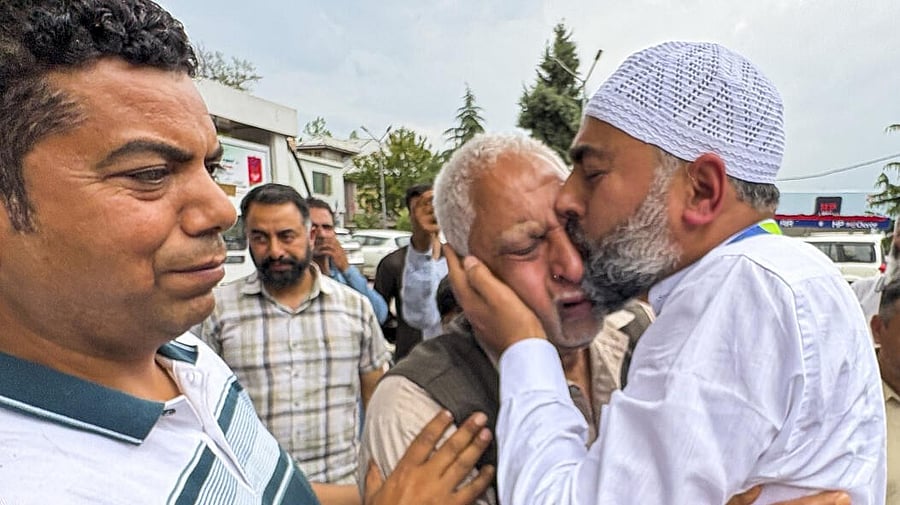
Pilgrims bid farewell to their family members as they leave for Delhi by road for their ‘Hajj’ pilgrimage, in light of the ongoing military conflict between India and Pakistan, in Anantnag district, Jammu and Kashmir, Friday, May 9, 2025.
Credit: PTI Photo
Srinagar: As the echoes of sirens faded and the valley breathed its first sigh of relief in days, hundreds of Hajj aspirants across Kashmir wept — not in despair, but in overwhelming gratitude.
The ceasefire between India and Pakistan, announced on Saturday evening, arrived like a divine mercy for pilgrims who had nearly lost hope of making it to Mecca.
For a week, fear hung heavy over the valley. After the deadly April 22 attack on tourists in Pahalgam, the region teetered on the edge of a deeper conflict. Cross-border shelling, drone alerts, and missile threats pushed the government of India to shut down 32 airports across the north, including Srinagar.
With it, the hopes of hundreds of Kashmiri Hajj pilgrims, to make it to Mecca for the once-in-a-lifetime pilgrimage they had dreamed of for years, were suddenly suspended. This year, 3622 pilgrims were selected to undertake the Hajj pilgrimage from J&K. Of these, only 178 have departed from Srinagar, while 480 J&K pilgrims who had chosen Delhi as their embarkation point have successfully left.
“I kept praying day and night, begging Allah to let me set foot in His house,” said 65-year-old Ghulam Mohammad from Srinagar, holding tightly to her prayer beads. “We did all the preparations, all the paperwork, and then suddenly we were told the airport was closed. It was like someone pulled the ground from beneath our feet.”
Since May 6, each day has brought more cancelled flights and more sleepless nights for Hajj aspirants. At Haj House and in homes across the valley, pilgrims waited — not knowing whether they would ever get to walk the sacred ground they had dreamed of all their lives.
Only one Hajj flight managed to take off from Srinagar on May 4, carrying 178 pilgrims to Jeddah. Since then, silence and sorrow took over the Haj House, where hopefuls waited for news as each subsequent flight — scheduled through May 14 — was cancelled.
Then, on Saturday night, came the news they had all been praying for — a full and immediate ceasefire.
Tears flowed. Families embraced. Prayer mats were unrolled in gratitude.
With both nations announcing a full and immediate ceasefire, the mood among Hajj aspirants shifted from despair to cautious celebration. Tears flowed freely — this time, tears of gratitude.
“My mother, who’s 62, fasted every day this week for peace,” said Mushtaq Ahmad from Budgam. “When we heard the ceasefire was confirmed, she fell into sajda and wept like a child. She told me — ‘Allah listens. He has opened the road to His house.’”
Officials have now begun work to reschedule the cancelled flights. “We’re coordinating with the Hajj Committee and aviation authorities to ensure all pilgrims are accommodated,” said a government official.
But for the pilgrims, the journey now holds a deeper meaning.
In the quiet halls of Haj House and in homes where suitcases are being packed again, there is a renewed sense of purpose — a sense that this journey, delayed and uncertain as it was, has become something sacred even before it begins.
“We will leave with prayers on our lips,” said 60-year-old Hajira Jan. “Not just for ourselves, but for peace in every heart, every land. That is our Hajj.”